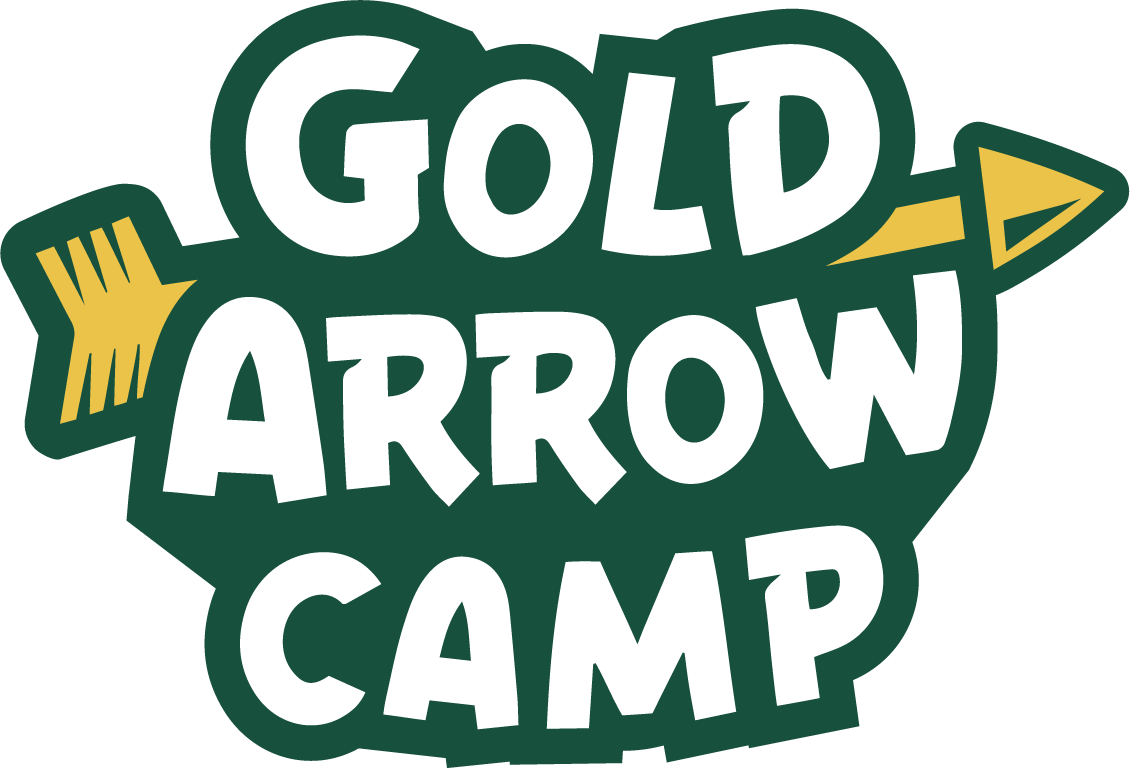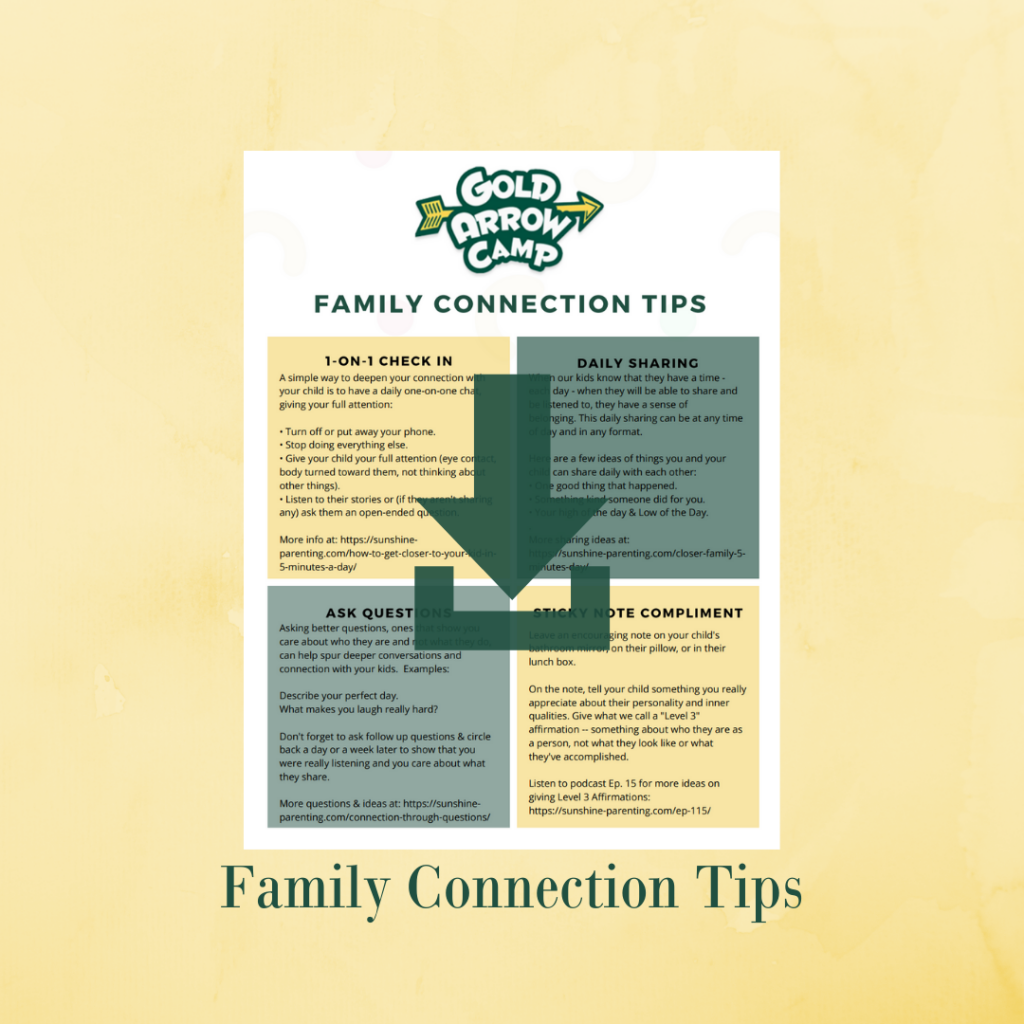HAPPY CAMPERS is now on Audible!
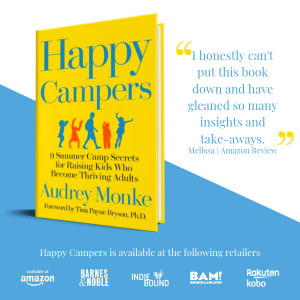 LISTEN TO “THE MAGIC OF CAMP,” AN EXCERPT FROM HAPPY CAMPERS.
LISTEN TO “THE MAGIC OF CAMP,” AN EXCERPT FROM HAPPY CAMPERS.
Inspiring and irresistibly practical! Happy Campers is a post-millennial parenting treasure–brimming with dozens of essential, achievable and transformative parenting strategies. Laugh and cry with Audrey Monke as she masterfully distills a lifetime of professional camp director wisdom that will guide your family to great joy and fun together while becoming more deeply optimistic, communicative, resilient, adaptable, socially competent and emotionally confident.
-Tom Rosenberg, American Camp Association
About five years into her parenting journey, our very own Audrey “Sunshine” Monke realized it was time to take some best practices from camp into her home – knowing that connection, positive parenting, fostering independence, grit, and kindness – all things we do at camp – are things that can help build a stronger bond between parents and children at home, and just make life at home more fun! That’s why she wrote Happy Campers: 9 Summer Camp Secrets for Raising Kids Who Become Thriving Adults – to provide a resource parents could use for years to help families connect and thrive.
We are excited to announce that, just in time for summer, Sunshine’s book Happy Campers: 9 Summer Camp Secrets for Raising Kids Who Become Thriving Adults is now available from Audible! Download your copy today and learn how to bring the fun of camp into your home!
Let HAPPY CAMPERS serve as a resource to help you better connect with your kids, create a positive family culture, and use through the years to coach your kids to grow their kindness, optimism, grit, responsibility, independence, and friendship skills, the way we do at camp.
Sign up here for immediate access to Happy Campers resources, including Sunshine’s most popular READY FOR ADULTHOOD & SOCIAL SKILLS checklists, Questions for Connection, a Family Meeting Agenda, and a 9-Week Read-Along guide with free, printable resources just in time to kick off your summer!
With this book, parents can bring home the magic of camp and learn all the simple secrets the counselors use to build meaningful relationships that will help your child grow and meet their fullest potential as young adults.
Dr. Jim Sears, Pediatrician
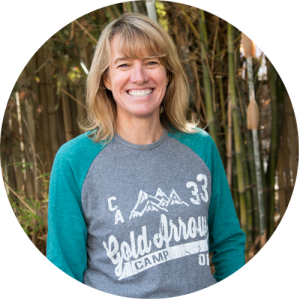
Audrey “Sunshine” Monke, MA, has been the owner of Gold Arrow Camp since 1989 and currently serves as the Chief Visionary Officer. In addition to her vision-casting and mentoring at GAC, Sunshine is an author (Happy Campers: 9 Summer Camp Secrets for Raising Kids Who Become Thriving Adults), Host of the Sunshine Parenting podcast, speaker and coach on the topics of parenting, social skills, and happiness. Find out more at her website, Sunshine Parenting.
Visit Sunshine Parenting for more resources for raising kids who become thriving adults.
Happy Campers at Home: 4 Ways to Boost Family Relationships
 Audrey “Sunshine” Monke, GAC’s Chief Visionary Officer, researches, writes, and speaks about parenting, social skills, and strategies for raising thriving kids at Sunshine Parenting. In her book, Happy Campers: 9 Summer Camp Secrets for Raising Kids Who Become Thriving Adults, Sunshine shares simple ideas parents can use to create the fun, connection, growth, and happiness of GAC at home. Here are four of Sunshine’s favorite connection tips for families.
Audrey “Sunshine” Monke, GAC’s Chief Visionary Officer, researches, writes, and speaks about parenting, social skills, and strategies for raising thriving kids at Sunshine Parenting. In her book, Happy Campers: 9 Summer Camp Secrets for Raising Kids Who Become Thriving Adults, Sunshine shares simple ideas parents can use to create the fun, connection, growth, and happiness of GAC at home. Here are four of Sunshine’s favorite connection tips for families.
If you were to ask me the most important thing parents can provide their children, camp counselors can provide campers, and teachers can provide students, I can sum it up with one word: Connection.
-Audrey “Sunshine” Monke
Building a relationship and connecting with kids—while also helping them learn to connect with each other and form friendships—is the most important experience we can provide our kids to inoculate them against the inevitable setbacks they will face in life.
Here are some simple ideas from GAC for boosting family connections.
One-on-One Check Ins
On our counselor job description, one of their duties is to “check in with each camper, every day.” We call these check-in meetings “One-on-Ones.” Counselors ask campers specific, open-ended questions to elicit how campers are feeling. The counselors ask about their friendships, activities, how much they’re missing home, what’s going well, and if they need help with anything.
These are individual conversations, out of earshot of other kids, that last anywhere from two to five minutes. The campers get accustomed to the check-ins, so they’re not surprised when their counselor starts chatting with them.
As a simple way to deepen your connection with your kids, and know how you can best support them, try having at least one daily one-on-one chat with each of them, modeled after what camp counselors do:
Turn off or put away your phone (and have them put theirs away, too).
Stop doing everything else (cooking, looking at a magazine, etc.).
Give your child your full attention (eye contact, body turned toward them, not thinking about other things).
Ask them a few open-ended questions. “Tell me about the best part of your day” is an easy place to start.
Your one-on-one chats can be anytime. You can make it a daily ritual over an after-school snack, while sharing a hot drink, or while tucking them in at bedtime, but that small, concerted daily investment of time will lead to a closer connection between you and your kids.
If your kids are already teens, know that the best way to have one-on-one chats is to be open to whenever they initiate the talk with you rather than forcing them to be on your schedule. When they talk, drop everything else you’re doing, focus on them, and listen!
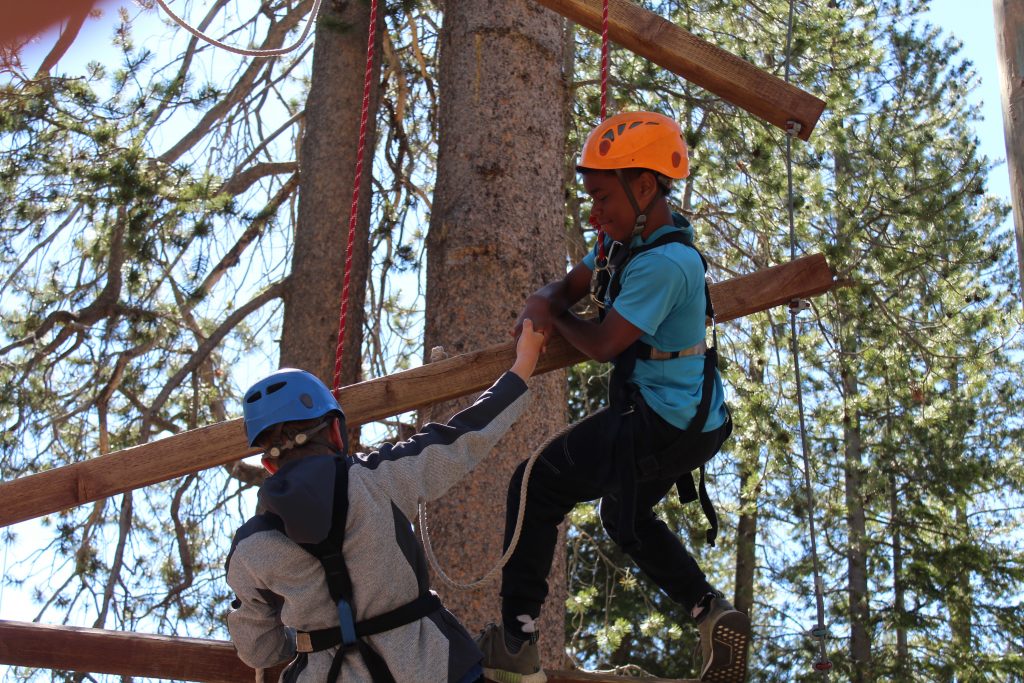
Daily Sharing
A highlight of each day at camp is our evening campfire. Gathered around the fire, counselors lead a daily sharing practice. Campers remember these conversations fondly and the evening campfires are many campers’ and staff members’ favorite camp memories.
Find a time each day – dinner or bedtime are often good times to set up a consistent sharing practice – to spend just a few minutes sharing with each other.
The only rules for your daily sharing are that one person speaks at a time and everyone else listens to the person speaking. Your kids may need a few reminders, as listening attentively is a skill most of us need to work on!
Your kids (especially if they are preteens or teenagers) may balk when you bring up the idea of daily sharing and do it for the first time. Stay strong. They will eventually learn to appreciate your daily sharing practice. Even if they continue balking, don’t stop. Even if they don’t show it on the outside, they will eventually come to appreciate a time each day when caring people listen to what they have to say.
Here are a few daily sharing ideas:
“Highs & Lows” or “Roses & Thorns”
This is a simple and well-known sharing practice where each family member shares something good that happened in their day (a high) and something bad (a low). Sharing often leads to stories and discussion about different events — the side track conversations are good, so let those happen! There are also additions you can add. At camp, we often do High, Low, and Hero, where each camper shares their high and low as well as someone who was kind to them or a “hero” that day. Another twist on this activity is called “Rose, Thorn and Leaf.” The rose is the high, the thorn is the low, and the leaf is something you’re looking forward to.
Three Good Things
Each person shares three good things that happened in their day or three things they are grateful for. This gratitude exercise (when journaled) has been proven to reduce depression symptoms. While your sharing conversation won’t be written down (unless you choose to do so), it can still bring a positive focus to your sharing. Ideally, because everyone anticipates the daily sharing, everyone will be more aware of and looking out for the positive things that happen every day.
Kindness
Sunshine loves the idea of sharing something each person did that was kind or something kind someone else did for you. Focusing on kindness is incredibly important in our increasingly unkind-seeming world.
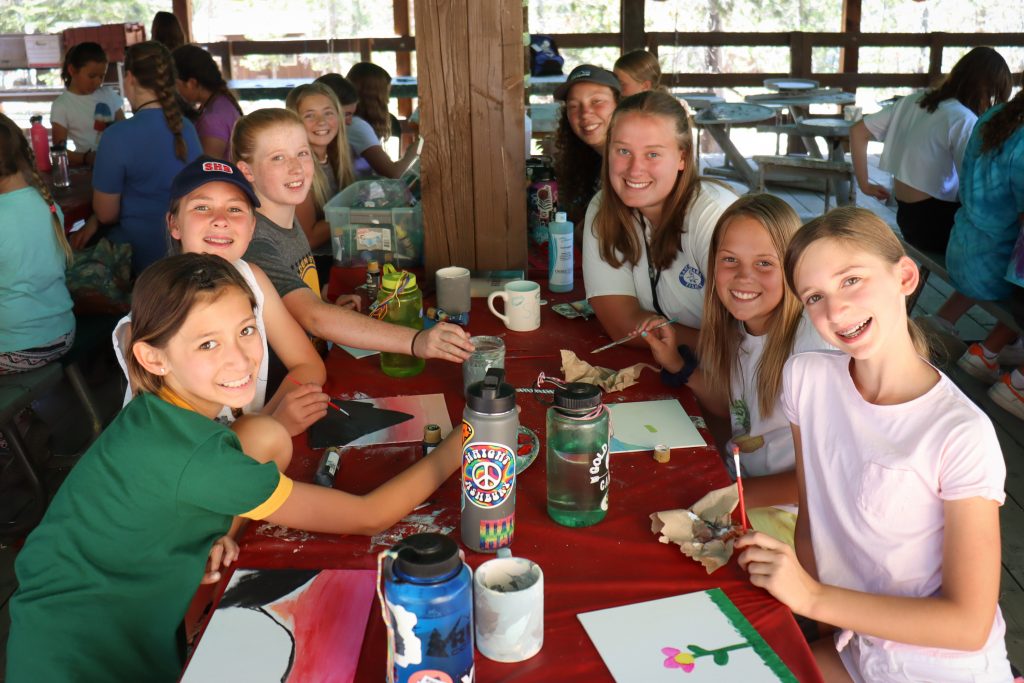
Ask Questions
Questions are a great way to connect with each other and get conversations started.
Here are a few to get you started (from the Questions for Connection GAC counselors use):
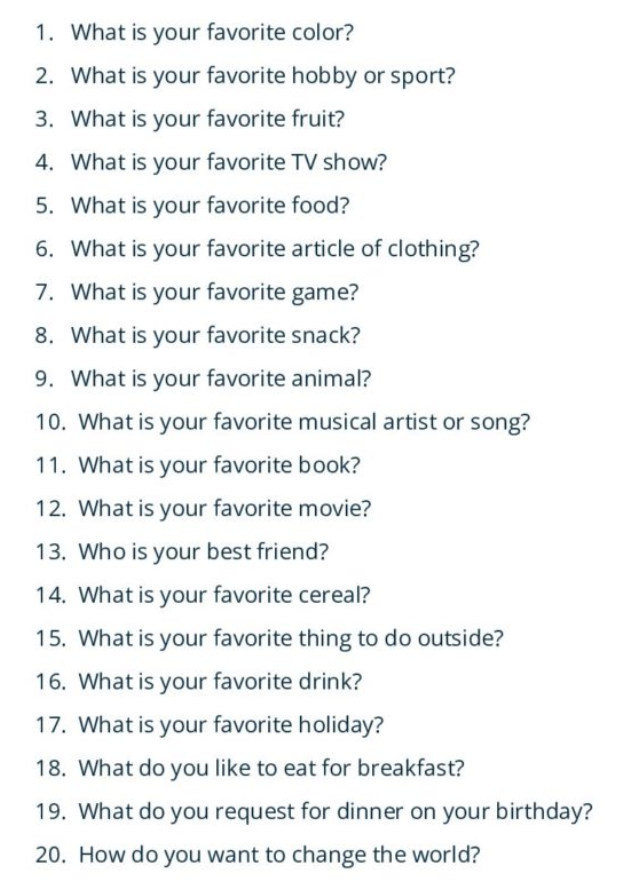
Sticky Note Compliment
At GAC, we focus on campers’ strengths and encourage them to think about building upon their strengths. Often as parents we spend a lot of time managing our children or helping them with things they are not good at. A great way to connect and make your child feel great is to leave an encouraging note on your child’s bathroom mirror, on their pillow, or in their lunch box. Tell your child something you really appreciate about them and something that’s an inner quality or strength.
